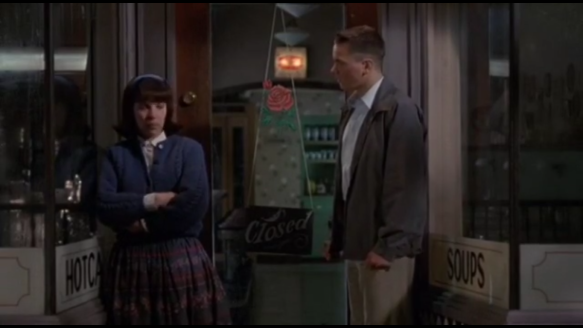If you’re a bit of a finicky nerd for cultural context like myself, you realize right when we hear Brenton Wood’s “Oogum Boogum Song” wafting down the city street from a car radio, we can carbon-date the scene to around 1967. A marine steps off a bus with a slight limp. He must have been in Nam, but we don’t know what waits in front of him.
Nancy Savoca’s Dogfight gets its name from a particularly uncomfortable ritual where a group of soldiers looks to scrounge up the ugliest girl they can find for an evening to dance and (hopefully) win the crown for finding the hag to rule them all.
The story takes us back to November 1963 on the eve of JFK’s assassination. The Vietnam conflict has yet to escalate and in the youthful age of Camelot, the peace corps, space races, and enduring American exceptionalism, the world still feels very naive indeed.
We are inundated by the rowdy bravado of four youthful marines, led by Eddie Birdlace (River Phoenix), who have a short stopover before heading overseas. The collective group mentality that bonds them fast and fierce also churns up this festering culture of vitriol and misogyny.
It’s probably just as much a part of what will give them a fighting chance to stay alive. Because even their boyish cajoling and catcalls ring with untrained naivete. They have yet to see death in the face, and for now, they feel indestructible.
Birdlace is just one of the boys, bellicose and burning with rage and impudence. Phoenix wears this quality behind his eyes to go with his high-and-tight haircut and the casual profanity permeating every conversation. He’s constantly operating through an economy of fear, payback, and entitlement. That means a snooty waiter gets dressed down with such a pointed outburst that not even Ferris Bueller could have conceived.
But he also knows how to turn on the charisma in a smarmy sort of way. It sets the stage for their competition as he winds up in a late night coffee shop trying to romance the young woman working the after hour shift.
Lilli Taylor transforms from a moody rocker in Say Anything or even her animated turn in Mystic Pizza, in a change involving more than a poofier hairstyle. Her entire constitution is different. She falls quite easily into her role as a sensitive waitress with dreams of folk singing and maybe meeting a boy to love. We believe that she might just fall for him. He could make her fall for him. But she’s also not a moron. She’s sincere and sees through the insensitive game.
It makes for an uncomfortable evolution as we sympathize with her compromising position and also watch Birdlace grow increasingly conflicted. This girl is a lot more than he assumed (and it’s not just about her looks).
The most compelling comparison I could offer is The Clock starring Judy Garland and Robert Walker. They’re both films about capturing a moment in time with a relationship that has a defined, even finite, beginning and end lending this heightened sense of meaning to every interaction.
Dogfight‘s vulgar and much more a movie for the ’90s even as it’s a film for the Vietnam era so different than the WWII reality Vincente Minnelli developed decades earlier. There’s often something a bit twee about these period efforts partially because we’re accustomed to experiencing the world through the nostalgia of black and white.
Dogfight also provides a more cathartic resolution. I’m not sure if it’s too rushed or what it adds exactly, and yet as an audience member, it gives us some form of wish fulfillment seeing two people reunited in a changed world. It makes the ambiguity of the prologue a bit clearer. There’s a purpose to the time jumps.
It can be summed up in an image: Birdlace is the one who’s come back from the shores of Vietnam 4 years later. He finds that same cafe and limps in. There she is. Surely she wasn’t waiting all this time? And yet they share an embrace in that cafe that’s long and awkward — extended out. The way Phoenix hunches over on her shoulder almost feels like the posture of a little boy. That’s it. We want to believe that these kinds of small, intimate connections are in fact possible in the unknowable chaos of the world at-large. It’s a vein of hope in a tumultuous world.
Phoenix’s career was always morphing and maturing in all manner of ways. In hindsight, we can watch how he took early nebbish roles like Explorers and Family Ties guest spots only for Stand by Me to be a stepping stone to a varied future. Running on Empty garnered critical acclaim, but then he zigzagged his way through an array of projects as diverse as I Love You to Death, Dogfight, My Own Private Idaho, The Thing Called Love, and yes, even Indiana Jones and The Last Crusade.
He never seems to be duplicating himself, and it makes for a mostly enthralling viewing experience. Because here is a performer who seems locked in and totally engaged with not only his craft but the poetry of moviemaking and at such a formative age too. Dogfight is an imperfect film built out of period artifice, but it also has these pockets of magic thanks in part to Phoenix and Taylor.
3.5/5 Stars

